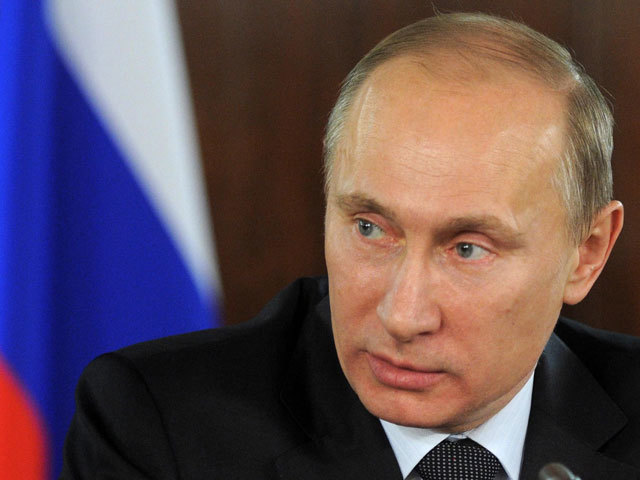
President Vladimir Putin said Russia scrapped a proposed $45 billion Black Sea pipeline to carry gas to Europe, the latest sign economic ties with the European Union are breaking down as the Ukraine crisis persists.
Shelving the South Stream project ensures pipelines through Ukraine will remain vital supply links to Europe for years to come.
The route under the Black Sea would have offered Russia’s OAO Gazprom a more direct path to feed the continent’s gas needs, a plan the EU objected to because it would reduce Ukraine’s leverage against its neighbor.
“That’s a defeat that they are trying to mask as a victory,” Igor Bunin, director for Moscow-based Center for Political Technologies.
“The South Stream project was dying despite many attempts Russia made, despite the money it spent to keep the project alive.
“Sanctions and the general mood in Europe made this project impossible.”
The decision comes as Putin struggles to prevent Russia from falling into recession amid plunging oil prices and lingering sanctions from the nation’s annexation of Crimea.
In lieu of South Stream, Russia will concentrate on supplying gas to Turkey through a different Black Sea pipeline, Putin said after meeting with his Turkish counterpart Recep Tayyip Erdogan in Ankara yesterday.
A dog stands near unfinished sections of pipeline sitting beside farmland at the halted…Read More
“Europe for some years has seen Russia not as a source of energy security, but as a risk,” Fyodor Lukyanov, head of the Moscow-based Council on Foreign and Defense Policy, an adviser to the government, said by phone.
“When the conflict with Ukraine started, it became clear that building this or any other new pipeline to Europe was impossible.”
The EU asked member states to stop the construction of parts of the pipeline connecting Russia with Bulgaria.
Russia can’t start building an underwater pipeline and stop at Bulgaria, Putin said after the meeting.
“The project is over,” Gazprom Chief Executive Officer Alexey Miller said in Ankara yesterday.
Gazprom had spent 487.5 billion rubles ($9.4 billion) in the last three years on South Stream and upgrading the Russian pipelines that would have supplied it, according to bond filings.
Some of that work can be used for a separate link to Turkey.
The company would probably write off some investments, reducing dividends planned for this year and next, Alexei Kokin, an oil and gas analyst at UralSib Financial Corp said.
Ending the project may save Gazprom from unnecessary spending in the future because there’s already sufficient delivery capacity to Europe, said Mikhail Korchemkin, a former analyst for theSoviet Union’s Gas Ministry, founder of Malvern, Pennsylvania-based East European Gas Analysis.
“There won’t be any new pipeline to Europe,” said Korchemkin. “That may be not the worst news for the company at the end of the day.”
Gazprom shares gained 0.9% to 145.33 rubles as of 12:56 p.m. in Moscow, while the benchmark Micex Index rose 0.1%.
“If Europe doesn’t want to realize this, then it means it won’t be realized,” Putin said of South Stream. “We will redirect the flow of our energy resources to other regions of the world.”
Russia will concentrate on supplying gas to Turkey through the Blue Stream pipeline, increasing deliveries by 3 billion cubic meters a year and offering a 6% discount from January 1, Putin said.
Gazprom’s partners in the Black Sea section of the pipeline were Eni SpA (ENI), Electricite de France SA, and Wintershall AG.
Russia plans to prepare alternatives for companies that signed contracts for the South Stream pipeline, Energy Minister Alexander Novak said. Supply contracts and intergovernmental agreements surrounding the project remain in force, he said.
The nation will also speed other projects to export liquefied natural gas, Putin said.
In lieu of South Stream, Gazprom and Turkish pipeline company Boru Hatlari Ile Petrol Tasima AS plan to build a pipeline capable of shipping 63 billion cubic meters a year from Russia to Turkey.
The infrastructure built in preparation for South Stream will be used for this pipe, Gazprom’s Miller said.
About 20% of that capacity, 14 billion cubic meters, will go to Turkey, Miller said. The rest will be shipped through Turkey’s pipeline network to the Balkans, he said.
Russia can build an additional gas hub for the South European consumers on Turkish territory, near the border with Greece, if needed, Putin said.
“This has been Plan B,” Edward Chow, a senior fellow at the Center for Strategic International Studies, said. It allows Russia to meet increased demand in Turkey and in the Balkans, while avoiding Ukraine transit risk, and then expand capacity once the route has been established, he said.
“It’s less risky than original South Stream, but still expensive at a time when Gazprom and Russia’s finances are severely constrained,” Chow said.
Recommended for you
